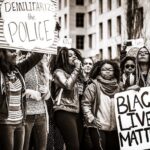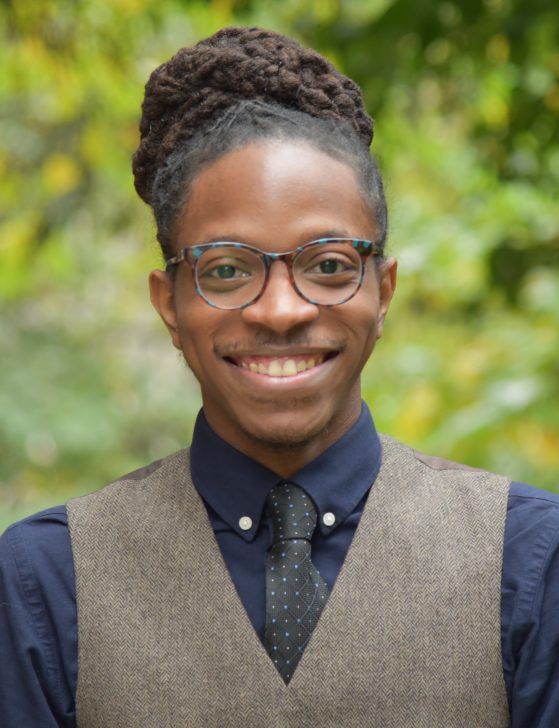- About
- News
- Events
- Initiatives
- Anti-Racism Collaborative
- Change Agents Shaping Campus Diversity and Equity (CASCaDE)
- Diversity Scholars Network
- Inclusive History Project
- James S. Jackson Distinguished Career Award for Diversity Scholarship
- LSA Collegiate Fellowship Program
- University Diversity & Social Transformation Professorship
- Publications & Resources
- About
- News
- Events
- Initiatives
- Anti-Racism Collaborative
- Change Agents Shaping Campus Diversity and Equity (CASCaDE)
- Diversity Scholars Network
- Inclusive History Project
- James S. Jackson Distinguished Career Award for Diversity Scholarship
- LSA Collegiate Fellowship Program
- University Diversity & Social Transformation Professorship
- Publications & Resources

“Voting and Equity in the United States”
January 31, 2019
“The Black Radical Tradition of Resistance”
February 28, 2019Scholar Story: Dominique Thomas
"Black students want to be valued. They aren’t just nameless brown faces that you can put on pamphlets to say that the school is diverse."
Student campus climate surveys are a common fixture on college campuses. Their prevalence is due to the numerous studies highlighting that how students experience their campus environment influences both their learning and development. Students thrive in healthy environments, free of the negativity of discrimination, where inclusion and respect for diversity is the daily norm.
However, many of these campus climate surveys do not center the experiences of African American students — a population of students who have persevered through unwelcome, hostile, and violent racial climates at their colleges and universities throughout history. That is, until now. In 2017, Dominique Thomas created a campus racial climate measure specifically for African American college students with the goal of developing a culturally-relevant measure based on the experiences of African American college students.

Dr. Thomas is a scholarship-to-practice fellow at the National Center for Institutional Diversity. His scholarship focuses on the experiences of African American college students, specifically how in how African American college students experience the campus racial climate as a reproduction of institutional, cultural, and individual racism.
I caught up with Dr. Thomas to learn more. This interview has been edited for clarity and length.
Tell me a little about this scale you created.
It’s called the Campus Racial Climate for African Americans Scale. It was created out of my desire to create a better academic and social environment for African American students and improve their sense of belonging on college campuses.
To create the scale, I conducted a mixed-methods study. I started off with group interviews of African African students, and I developed original survey questions from those responses. Then I sent out a survey with questions from another survey to a smaller subset of students so they can say whether or not the particular experiences covered in these items were relevant to them. I combined both sets of questions together, and then condensed the questions even further to create the final scale. Finally, I sent out the final scale to students to validate the measure.
The scale breaks down into three main themes. There’s a scale for institutional factors. This focuses on the institutional practices and policies on campuses, such as the curriculum or if there’s an African American studies department.
Another theme is interracial interactions between students. So how do students interact with one another? Are students comfortable interacting with students of different races? Or do they just stay in their own ethnic enclave on campus?
Finally, there’s racial experiences and perceptions. Do students experience negative stereotypes, lower expectations, feeling like they have to go above and beyond to be recognized?
What did you learn from your study?
Very broadly, the students do want to feel like they belong on their campus. They want the administration to make a statement against racist actions such as the posting of white supremacist stickers around campus. They don’t want to wait until their last year of college to have their first Black professor, especially at a campus that’s in downtown Atlanta. There is a demand and a need for these things.
Also, it’s not very often that people straight up ask students what they want. I think about so many different educational initiatives on campuses, and no one really asks the students what they want. It's a bigger issue when you're thinking about the Black students because it’s a population of students that people don't think about in the same way. Because when Black students ask for something, it’s always met with the “we’ve made progress” type of thinking or “why are you complaining, you’re at this school, it’s a great opportunity.” Is it a great opportunity if their mental health is suffering, and they hate it here?
Black students want to be valued. They aren’t just nameless brown faces that you can put on pamphlets to say that the school is diverse. They want to feel fulfilled when they go to class. They want to learn things that are useful to solve problems or issues in their own communities.
What prompted you to examine this line of research?
Just being a Black person in educational spaces my whole life. All the different things I have noticed throughout time, and then taking in all these observations and trying to make sense of them. For example, in educational spaces, I noticed that I was the only Black person in the class. At that time, I would ask, “Why am I the only Black person in the class?” And then I noticed that this was happening in the advanced classes. I’m thinking, Is there something going on here? But I didn’t have the language or research to understand what was happening. This started me on my journey to explore these questions.
What are the key takeaways of your work?
First, race and racism always reproduces itself through different institutions, especially higher education institutions. This becomes important in how we deal with race and racism in this country. Since educational institutions are meant to train people in how to be a “good citizen,” it is necessary to understand how these institutions maintain the status quo.
Second, these concerns of African American college students do not come out of nowhere on college campuses. These are concerns that have been around for over 100 years. The fact that universities are still dealing with these issues shows that we have not progressed to the degree that we said we have or progress is not what we think it is. Higher education institutions have not dealt with the root issue of not valuing Black students to the same level as White students.
Third, I want to dispel the myth that just because a school is diverse that there are no problems with it. Outward facing diversity is not the same as equity. There’s a difference between being diverse and caring for the people who make up that diversity.
Are you interested in Dr. Thomas’ work? Feel free to reach out to him. Visit his profile here.




